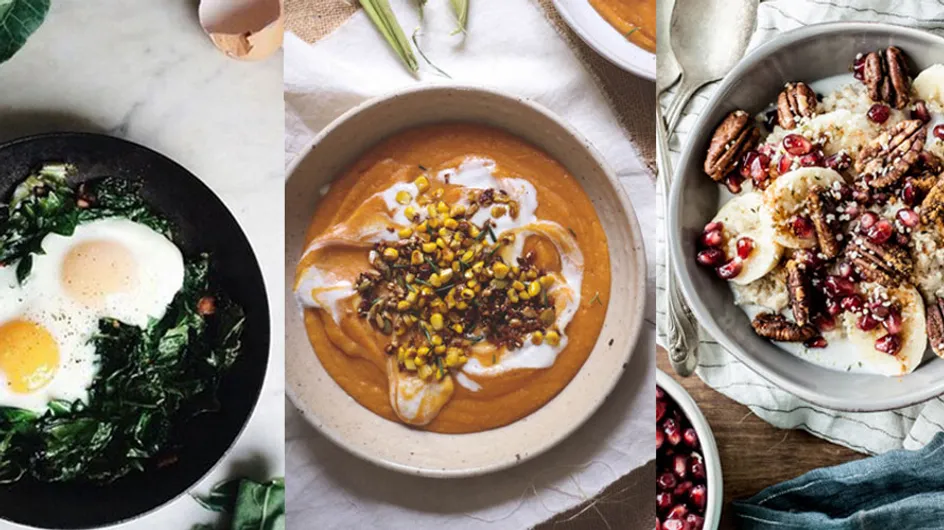"It's not a myth or fabrication," Megan Wolf, (MS, RD) registered dietitian and owner of Megan Wolf Nutrition, says. "Some foods really do help to keep us satisfied and feeling full much better than others. Foods containing fibre, protein and healthy fats delay stomach-emptying, which is why you feel fuller and more satisfied from them."
Nikita Kapur, (MS, RDN, CDN, CLT) a registered dietician and nutritionist for Compass Nutrition, agrees with this sentiment, noting how she recommends that patients make sure their fibre intake from whole grains, fruits and vegetables is adequate.
"They contain fibre that not only provides satiety but also makes sure that your blood sugar levels don’t fluctuate," Kapur says. "So the science behind that is the foods that are high in fibre relatively tend to have lower glycemic index. They prevent the spikes in low blood sugar levels throughout the day. And if the blood sugar levels are not spiking throughout the day, then your insulin levels are not spiking throughout the day, and that sort of keeps the hunger in check."
So to ensure that you're getting a good balance of fibre, protein and healthy fats from your diet, you should start incorporating these six foods into your life to keep you feeling satisfied all day long.
Soups
There's nothing better than a hearty soup, especially on a cold night. All you Northerners out there know exactly what I'm talking about. And although you might not be reaching for that can of Heinz when you're on a starving belly, it's a definite go-to if you want to keep yourself full.
No time in your schedule to cook? Prepare something in your slow cooker on the weekends and you'll have soup for days!
"Soups tend to be satisfying because of the high water content in the broth," Jennifer Calo, (MS, RDN, CDN, CDE) a registered dietitian and nutritionist for Compass Nutrition and certified diabetes educator, says. "Soups often contain beans, lentils and veggies which all contribute dietary fibre, leading to satiety."
Wolf agrees with Calo, noting that in addition to vegetable and beans in a soup, protein-rich meats in a meal like this can also fill you up. With that said however, make sure you're not immediately choosing something like broccoli and cheese (as amazing as it is) over French onion or lentil and bacon soup.
"Be sure to always opt for a broth or tomato based soup over a cream based soup to cut down on calories and saturated fat," Wolf says.
Seeds
Seeds are everywhere and you absolutely have to start eating them. So make sure to treat yourself to this healthy snack between small meals to prevent you from munching on junk food throughout the day. With chia seeds, sunflower seeds, pumpkin seeds and pomegranate seeds among others, there are so many options available. There's really no way you can get bored with the variation out there.
"Healthy fats are mostly plant proteins or fats from plant sources," Kapur says. "So that would be your nuts [and] seeds."
Though Kapur does recommend including healthy fats like seeds into your diet from time to time, she also says to ensure that your diet is balanced at the same time.
"For someone who’s trying to lose weight and trying to manage their cholesterol, we would encourage more healthy fats but we might be mindful of the quantity," Kapur says.
Avocado
This notion of eating healthy fats also goes for avocados. In addition to this delicious fruit being a healthy monounsaturated fat, it's also full of fiber and generally helps with satiety.
According to a study from Nutrition Journal, "Researchers found that participants who added half of a fresh avocado to their lunch reported a significantly decreased desire to eat by 40 percent over a three-hour period, and by 28 percent over a five-hour period after the meal, compared to their desire to eat after a standard lunch without avocado."
So whether you're eating some guacamole on toast (it's so good), or simply adding some avocado to your sandwich for lunch, this is definitely a fat you want in your life. Yet as good as these babies are, again make sure that you're being mindful of how much you're actually eating. Half or a whole avocado per day should be fine, but it's still possible to have too much of a good thing.
"It’s who you’re talking to," Kapur says. "What their goals are, what their level of understanding is, [and] what their starting point is - that's what's good to keep in mind."
Eggs
Maybe it's just me, but eggs are probably the greatest thing in the world. It sounds dramatic but I'm always down for eggs in any of my meals; I've even had them sunny side up on my spaghetti when I couldn't find marinara. And as it turns out, with a combination of protein and fat, according to Wolf, this food can help you feel full longer.
"Some studies have shown that eggs have unique chemical compounds, which create appetite-suppressing effects," Wolf says. "Eggs have nutrients that benefit memory, brain and eye function. Also worth noting, eggs are often negatively touted as a cholesterol-filled food. While eggs do have cholesterol, research now shows that eating cholesterol doesn’t raise your blood cholesterol levels, eating saturated fat does."
Beans & Lentils
If beans and lentils are not already a part of your diet, they definitely should be. However, while I'm an avid fan of all things Mexican, there are better ways to go about adding these legumes into your daily meals.
"Bean and lentils pack a great one-two punch of protein and fibre," Wolf says. "This combination helps us to feel fuller, longer, on less food. Fibre is also great for controlling blood glucose levels, and can help to control cholesterol levels by lowering 'bad' LDL cholesterol."
From lentil chili to falafel to bean enchiladas and white bean garlic dip, there are plenty of ways to take advantage of these healthy, fulfilling pulses.
Porridge
A nice bowl of Porridge is the way to go for breakfast if you want to feel satiated and curb your hunger until lunch time. Plus, it's so easy to make and makes a great, quick meal if you're in a rush, or can simply be taken with you to work when you're heading out the door. Make sure to buy organic rolled oats and use healthy milks such as almond, oat or organic whole milk to make the most of your healthy brekkie.
"Porridge is healthy, easy-to-make, inexpensive and easily accessible," Wolf says. "It’s rich in soluble fibre, which slows digestion and keeps our bellies full."
Wolf also recommends to use unsweetened almond milk, and says you can top your oatmeal off with some crushed nuts, almond butter or cinnamon. Yum.
Will you add any of these foods to your diet? Tweet us @sofeminineUK!
This article was written by Emma Goddard. Follow her on Twitter @egoddardhokie.
You Might Also Like:
10 Amazing Health Benefits Of Pumpkin Seeds




















